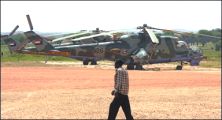Darfur ceasefire not holding : United Nations
By Opheera McDoom
KHARTOUM, Oct 20 (Reuters) – A ceasefire in Sudan’s Darfur region is not holding, with reports of an aerial bombardment and attacks by rebels, the United Nations said on Wednesday.

|
|
Two Sudanese military helicopters at El-Geneina airport |
The top U.N. envoy in Sudan, Jan Pronk, will meet the Sudanese foreign minister on Thursday to discuss the deteriorating security situation in Darfur, which is hampering humanitarian operations, said Radhia Achouri, spokeswoman for the U.N. Advance Mission in Sudan.
“Definitely the ceasefire is not holding,” she told reporters in Khartoum. Rebels and the government signed a ceasefire in April, but African Union monitors have since confirmed a number of violations from all sides.
She said the United Nations had received reports of a heavy bombardment in North Darfur, but were waiting to hear confirmation from the African Union ceasefire commission.
African Union-sponsored peace talks between the government and rebels are due to resume on Thursday in the Nigerian capital Abuja.
Achouri also cited a confirmed rebel attack on government positions near Kutum in another area of North Darfur on Oct. 19, where a number of people were injured.
Teams from international aid agencies have been harassed by Arab militias, known as Janjaweed, rebels and at a military checkpoint where government soldiers fired into the air on Oct. 16 in areas near the site of the rebel attack, Achouri said.
More than 1.5 million people have fled their homes in remote Darfur since a rebellion began 20 months ago. About 200,000 refugees are encamped in neighbouring desolate eastern Chad and the United Nations calls Darfur one of the world’s worst humanitarian crises.
After years of skirmishes between Arab nomads and mostly non-Arab farmers over scarce resources in arid Darfur, rebels took up arms accusing Khartoum of using Janjaweed to loot and burn non-Arab villages.
Khartoum admits arming some militias to fight the rebels, but denies any links to the Janjaweed, calling them bandits.
U.N. estimates place the death toll from hunger and disease at 70,000 since March. The Sudanese government disputes the figure. There are no reliable estimates for the numbers of those killed by the violence, which the United States calls genocide.
Achouri said the bulk of the blame for the deaths and for the humanitarian crisis lay with the government, which should not have used militias or allowed the situation to deteriorate.
Foreign Minister Mustafa Osman Ismail said on Wednesday that while it was possible there could be ceasefire violations from all sides, most of the violations were by the rebels.
